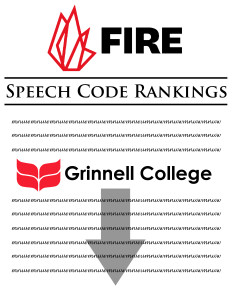Mira Braneck, Staff Writer
braneckm@grinnell.edu
The Foundation for Individual Rights in Education (FIRE) named Grinnell’s bias-motivated incident policy in its “Speech Code of the Month” in March. The organization sees the policy as restricting a significant amount of free speech on campus.
FIRE, a nonpartisan educational foundation, aims to “defend and sustain individual rights at America’s colleges and universities.”
“A speech code [is] any university regulation or policy prohibiting or excessively regulating expression that would be protected by the First Amendment in society at large,” FIRE wrote in a press release concerning their findings.
FIRE recently downgraded Grinnell’s speech code rating to its worst possible rating, “red light,” due to the policy. As it is written, the policy aims to allow targeted individuals and groups to report bias-motivated and/or hate crimes, outline the actions that may be taken by the school in the case of such an event and “[recognize] and [validate] the importance of the Grinnell College Nondiscrimination Policy.”
FIRE called the clause “an expression of hostility,” and claimed it posed a threat to free speech because determining what constitutes as hate speech is subjective. The organization said that the possibility of a student being suspended, dismissed or having their degree withdrawn according to the policy is “sure to a have a profound chilling effect on expression.” They described these measures as “draconian punishments.”
“If students can be punished for expressing any opinion that someone else subjectively perceives as hostile, discussion and debate of political and social issues will be severely curtailed,” wrote FIRE Director of Policy Research Samantha Harris in an email to the S&B. “This is inconsistent with the principles of free speech and academic freedom, and with Grinnell’s commitment to ‘free inquiry’ and an ‘open exchange of ideas.’”
While aware of the recent rating, the College has no plans to change the policy.
“There are plans to improve the Hate Crime and Bias-Motivated Incident protocols in the future by increasing training on bias for those who might be receiving and processing reports,” Andrea Conner, Associate Vice President of Student Affairs, and Lakesia Johnson, Chief Diversity Officer, wrote in an email to the S&B. “But, we have no intention of changing our policy that explicitly prohibits hostile, threatening and harassing behavior toward an individual or group due to their group identity. This behavior is antithetical to a private, residential liberal arts college where we rely on a sense of community to learn actively and cooperatively. Instead, we’ll focus our efforts on preventative measures, such as those listed in the last paragraph of our policy.”
While the College appreciates discussion about its policies, it believes the most important aspect of its bias-motivated incident policy is protection of students from discrimination and harassment.
“We appreciate discussions about balancing the rights of an individual to free speech and the rights of a private institution to enact policies that reflect its values,” wrote Conner and Johnson.
“It is important that institutions of higher education consistently engage in dialogue about the open exchange of ideas that is cited in our mission, as exposure to a diversity of thought helps clarify one’s own opinions. However, institutions are equally responsible for assuring that the behavior of some members of our campus does not hinder the rights of others to be free from harassment and discrimination that infringes on their right to receive an education.”
According to Conner and Johnson, the policy is similar to the College’s peer institutions.
“We feel confident that we are not an outlier among elite liberal arts institutions, despite FIRE’s concerns,” they wrote.


















































